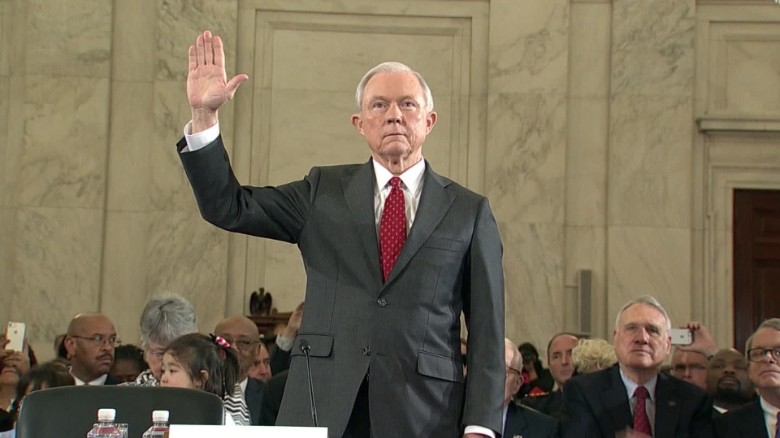A lawsuit in the 1990s had Alabama poised to fund poor black school districts as fairly as wealthy white schools. As state attorney general, Sessions fought the effort passionately. –
By Ryan Gabrielson –
ProPublica –
In the early 1990s, children across Alabama’s large rural stretches still attended faltering public schools, some with exposed wiring and rainwater leaking into classrooms. The education was in disrepair, too. Teachers couldn’t assign homework for lack of textbooks. A steel mill announced it would no longer hire local high school graduates because most tested below the eighth grade level. In short, Alabama’s most economically disadvantaged students, primarily black children and those with disabilities, were missing out on a basic education.
Then, for a moment, change seemed possible. A civil-rights lawsuit challenging the system for funding Alabama’s schools succeeded, and the state’s courts in 1993 declared the conditions in the poor schools a violation of Alabama’s Constitution. Gov. Guy Hunt, who had battled the litigation, accepted defeat, and vowed to work with the courts to negotiate a solution for equitably funding all of Alabama’s schools.
“This is a unique and timely opportunity to make historic improvements in Alabama’s public schools for our children,” Hunt said at a news conference in 1993, “and we will not miss this opportunity.”
Jeff Sessions had other ideas.
Sessions, elected Alabama attorney general just a year after the courts had begun review of reform measures, didn’t think the state’s courts should have any role in deciding how Alabama educated its children. He hired expensive private lawyers to fight the findings of the court — first at the district level, later at the state Supreme Court level. He succeeded in removing a judge sympathetic to the plight of poor students from the case. He filed appeal after appeal, insisting he be heard even after the state’s highest court issued final decisions. He fought every effort by the court to require that schools in the state’s poorer communities be funded at the same levels as its wealthier ones.
Sessions’s efforts won out — both in the short term, and in the end. His legal jousting across his two years as attorney general effectively prevented any overhaul to the way schools were financed in Alabama, and as a result helped drag out a case that would ultimately collapse years later when the makeup of the state’s top court turned over.
ProPublica tracked down and reviewed thousands of pages of court filings from the school funding case in Alabama. The legal argument Sessions made — again and again, and in the face of repeated rebuffs — turned on his view of the separation of powers. Only the legislature had the authority to decide how Alabama funded its schools, he maintained. Indeed, Sessions never spent a legal sentence arguing that Alabama’s educational system was equitable, that it didn’t clearly favor white and wealthier children while short-changing others. He simply argued the courts had no rightful place saying or doing anything about it.
“The court below is bound to stay out of the way so that the legislature, the executive and the administrative agencies can act to accomplish their constitutionally prescribed duties,” Sessions’ legal team wrote in one brief.
Today, Sessions has been nominated by President Trump to serve as the country’s next attorney general. At his confirmation hearings, Sessions pledged to uphold the nation’s laws, regardless of his own beliefs. But his Democratic detractors have openly expressed doubts he’d enforce legal decisions with which he or the administration didn’t agree. Already, any number of Trump administration initiatives have provoked the threat of legal challenge, and indeed over the weekend the president’s order limiting immigration from some Muslim countries wound up in federal court.
“The arc of the moral universe does not just naturally curve toward justice; we must bend it,” Cory Booker, the Democratic senator from New Jersey, said in testifying against confirmation for Sessions. “America needs an attorney general who is resolute and determined to bend the arc. Sen. Sessions’ record does not speak to that desire, intention or will.”
Trump transition officials did not respond to repeated request to interview Sessions.
The complicated and volatile history of desegregating the American South is full of examples of local officials deriding and even defying federal court orders. In this instance, however, Sessions was taking on his own state’s courts — Alabama judges with backgrounds not unlike his.
By the 1990s, Alabama’s educational problems were many. But nearly all came down to money. State government provided a share of the public education funding, but the most critical revenue came directly from local property taxes. Schools flourished in wealthy communities, as a result, and struggled in impoverished ones.
DeWayne Key, then superintendent of a low-income school district in northern Alabama, rallied other rural education leaders to fight what they regarded as an unequal system. They formed a new organization, the Alabama Coalition for Equity, and in 1990 filed a civil-rights lawsuit in the state courts seeking “equity and adequacy,” Key said.
The plaintiffs’ argument was essentially this: The unequal funding violated the state Constitution’s promise of an adequate education for all children. Two years of pitched legal battle followed, as lawyers for the poor schools introduced volumes of statistical evidence at trial, one conducted at the district court level. The plaintiffs triumphed, and in early 1993, Circuit Judge Eugene Reese declared Alabama’s public-school funding to be unconstitutional.
“The quality of educational opportunities available to a child in the public schools of Alabama depends upon the fortuitous circumstance of where that child happens to reside and attend school,” Reese wrote in his decision holding the state’s educational funding mechanism in violation of the state’s Constitution.
Reese gathered the state’s elected leaders, education officials and experts into committees to set up reform plans that he would impose through court orders.
Then-Gov. Hunt had no sooner pledged to help rectify the state’s school financing than he was out of office, convicted of violating an ethics law. His successor, Fob James Jr., had little use for the court’s decision, and in Sessions he found a legal combatant eager for active resistance.
Sessions had been federal prosecutor in Alabama from 1981 to 1993, and had earned a nomination by President Reagan to the federal bench. But Sessions underwent a bruising and ultimately failed nomination fight. He was pilloried during his Senate hearings as a man hostile to civil rights, maybe even an outright racist.
With the support of James, Sessions, his career back on track, set out to win a lawsuit the state had already officially lost, and lost badly. Sessions hired a slate of outside lawyers, including some of Alabama’s most highly regarded litigators. He sought to vacate the award of legal fees to the plaintiff lawyers that Reese had ordered. He successfully ousted Reese from the case, convincing a judicial investigatory panel that Reese had inappropriately campaigned for election to the state Supreme Court by touting his role in the school case. Reese officially removed himself, following the panel’s recommendation.
Violations of Alabama children’s constitutional rights weren’t discussed, it appears, because the state lawyers believed they were none of the courts’ business. Judges playing any role in a school system run by Alabama governors and lawmakers was “a grave wrong,” they asserted.
William Gray Jr., James’ chief legal advisor, said his boss “strongly believed that the legislature ought to determine those things that were legislative” without judges intruding. Of Sessions, he added, “the attorney general’s office agreed with our fundamental view of the Alabama constitution.”
Sessions had little immediate luck with the state’s judges. Having successfully removed Reese from the case, Sessions asked Judge Sally Greenhaw, who took over the case from Reese in late August 1995, to dismiss the entire lawsuit. Greenhaw declined.
Sessions and his lawyers were unfazed; they filed their appeal to the state Supreme Court less than a week later.
Their arguments repeatedly referenced the separation of powers on which federal and state governments are structured. The three branches — executive, legislative and judicial — each have their own duties and authorities separate from the other two. A governor directs state agencies. Lawmakers pass laws and set spending. Courts resolve disputes.
“Of course the courts may decide whether an act of Congress or an act of a state legislature, or an act of a governor or an act of a president, violates guaranties of the federal or state constitution,” the state’s lawyers wrote. “There it stops.” Sessions argued that the courts were “bound to stay out of the way” of complex systems like public education.
Lawyers for the plaintiffs saw the separation of powers differently. The plaintiffs countered in their briefs that the Alabama Constitution did not just separate the branches, but gave each the authority to check the other two. Further, the plaintiffs argued, the restrictions that Sessions’ team wanted to place upon judges would render them unable to protect civil rights.
To illustrate the point, they wrote that if Alabama’s governor “barred all political speech,” then Sessions’ position would mean “this court could declare his actions unconstitutional, but could not order him to reverse them.”
Alabama’s high court ruled against Sessions’ team again and again, ultimately rejecting its legal reasoning in three different opinions between 1995 and 1997. Regardless, Sessions and James effectively won even as the losses piled up. To explain how requires a brief descent into the arcane details.
When the trial court ruled the state’s school funding unconstitutional in 1993, Reese had split the case into two parts. The first, regarding the system’s constitutionality, was called the “liability” ruling, because it declared Alabama officials were liable for failing to provide a basic education. The state did not appeal this ruling within the required 42 days, so it quickly became sealed as final. The second part, called the “remedy” phase, would include negotiating fixes and then implementing them.
By the time Sessions was sworn in as Alabama attorney general in January 1995, only the “remedy” case was supposed to be in play. But the state’s new top lawyer relentlessly attacked the whole by stalling any work on reforms, court records show. Sessions’ legal team swiftly appealed any decision, once even asking the state Supreme Court justices to immediately reverse themselves, which locked the case up for months.
Meanwhile, Gov. James opened another front in a war on the judiciary. James lobbied for three amendments to the state constitution on the June 1996 ballot directly related to the school funding litigation. The measures gave the state Senate the power to impeach members of the state Supreme Court, required lawmakers to approve any court orders that required state spending, and allowed non-lawyers to serve on the judicial inquiry panel. All passed with ease.
On election night, the Associated Press reported the amendments “were the result of Gov. Fob James’ efforts to rein in the judiciary and re-establish, in his view, the separation of the three branches of government.”
On Jan. 10, 1997, Alabama’s Supreme Court turned aside the thrust of Sessions’ arguments that the courts were outside their jurisdiction. “This objection to the exercise of judicial review of the constitutionality of Alabama’s public school system is tenuous at best,” Justice Ralph Cook wrote in the majority opinion. Judges had been a check on lawmakers since before Alabama became a state and maintained every right to serve in that role.
But while the Supreme Court had upheld the ruling against Alabama’s school system, it decided that the lower court should have first given the governor and legislature a chance to fix the shortcomings by themselves. The justices voided the trial court’s “remedy” orders and set a one-year deadline for lawmakers to enact reforms.
Sessions had by then won election to the U.S. Senate, so authority over the case moved to William Pryor, Sessions’ hand-picked successor. Seven days after the high court ruled, Pryor filed a motion asking the justices to reconsider the same legal arguments. (Pryor has recently been mentioned as a possible U.S. Supreme Court nominee, with Sessions reportedly favoring his candidacy.)
Eleven months later, the Supreme Court yet again reaffirmed the school funding situation was unconstitutional, but threw out the deadline for the legislature to enact reforms. The courts, in effect, now just identified constitutional violations, but no longer took any action to fix them.
Alabama lawmakers over the years began shifting property tax money into a trust for education, which boosted funding for the poorest schools slightly, but far less than the overhaul ordered in 1993. Otherwise, little improved.
By 2002, only one of the Supreme Court justices who had ruled on the finding case remained. The reconstituted court, surprising nearly everyone involved in the longstanding litigation, reversed the ruling on the funding’s constitutionality. No new arguments had been made; no new briefs had been filed.
Gray, Gov. James’ onetime legal advisor, said the justices had “decided on their own” to take the action.
In its opinion, the Supreme Court adopted wholesale the long-defeated reasoning of Sessions’ legal team. Any move to eliminate the school funding disparity “that the judiciary could impose would, in order to be effective, necessarily involve a usurpation of that power entrusted exclusively to the Legislature,” the justices wrote.
Today, Alabama’s public schools remain a story of inequality. The poorest districts only receive state funds to cover the minimum instruction, but nothing from local property taxes for music or art, or even enough to buy textbooks for each student. Analyses of test scores have shown Alabama ranks low nationally, especially in math, with both white and black students far behind their peers in other states.
The situation is especially dire for students with developmental disabilities, like autism, said Nancy Anderson, associate director of the Alabama Disabilities Advocacy Program. Poor schools are unable to pay for teachers to get even basic training in how to help these students.
Anderson attends individual student planning meetings for students with disabilities, and every suggested remedy brings up the same concern. “The elephant in the room is always, what’s it going to cost?” Anderson said. “And I don’t necessarily see that getting better any time soon.”
—
This story first appeared in ProPublica, a Pulitzer Prize-winning investigative newsroom.














